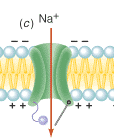The Generation of an Action Potential
If the graded potential is above the threshold voltage when it reaches the spike initiating zone, an action potential is triggered.
An action potential is a high depolarization in the axon of the cell, caused by the flow of particles after the opening of voltage-gated channels. Action potentials are regenerative, "all or nothing," self-limiting, unidirectional, and refractory.
If the graded potential reaches the threshold, the depolarization in the spike initiating zone causes an action potential to occur. The activation gate in the Na+ Voltage Gated Channels opens, allowing Na+ to flow in along its concentration gradient until it is at equilibrium.
The potential change induced by the opening of voltage gated channels decrements as
you record further and further away from the Na+ channel. However, this graded
depolarization triggers the opening of neighboring Na+ voltage-dependent channels, which
results in more Na+ entering the cell, and, in effect, regenerating the action potential.
 |
The activation gate opens and the inactivation plug is removed |